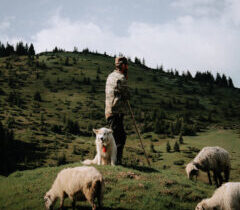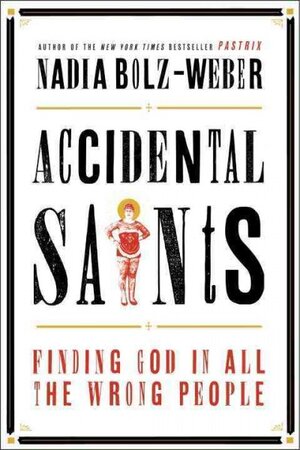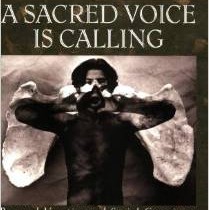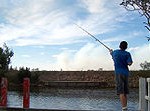Somebody Oughta Do Somethin’ About It
 If you or I had a nickel for every time we heard the phrase, “somebody oughta do somethin’ about it,” I think we would have enough cash for a special treat, if not a fine vacation. As people, we are social beings. We get together and share our thoughts and experiences, whether within our family circles or in our larger communities of work, school, church, clubs, gyms, etc. Since life is not perfect, there always seems to be something about which someone can and will complain. Wages are too low, the work is too hard, there aren’t enough safety measures, there are too many restrictions, too much homework, too many new people are moving into town, housing costs too much … And have you seen the price of eggs lately?
If you or I had a nickel for every time we heard the phrase, “somebody oughta do somethin’ about it,” I think we would have enough cash for a special treat, if not a fine vacation. As people, we are social beings. We get together and share our thoughts and experiences, whether within our family circles or in our larger communities of work, school, church, clubs, gyms, etc. Since life is not perfect, there always seems to be something about which someone can and will complain. Wages are too low, the work is too hard, there aren’t enough safety measures, there are too many restrictions, too much homework, too many new people are moving into town, housing costs too much … And have you seen the price of eggs lately?
These sentiments are heard even in relatively good times economically, socially, and politically. Life is not perfect, despite our wish it could be so – and what is good for me is not necessarily good for you or the neighbor down the street.
In our world today, it sometimes feels like everything has been tossed willy nilly into a big pot and stirred with the proverbial dirty stick. As Goofy might say, “Sumpin’ wrong here!” Things we should be able to count on are no longer steady and predictable. Will I have a job tomorrow? Is my Social Security deposit going to happen? Who has access to my health information? Is any data secure anymore? We simply don’t know.
“Somebody oughta do somethin’ about it!” But who and what? And is this something that has never happened in the world before our time? No, not really. We have gotten used to a system here that was designed to help keep things stable and predictable, governed by laws and branches of government that balanced each other out. It’s been a very special time and place where we have lived.
When we look at the experience of the Hebrew people through the centuries, there have been many times of upheaval and change. Invading armies carried people off into exile. Other nations conquered the conquerors and the people were allowed to return to their own land. Sometimes good kings served as rulers. Sometimes not. The land we call the Middle East today has witnessed thousands of years of turbulence.
The prophet Isaiah began his public career sometime around 742 BCE. This was a time when the king of Assyria conquered the northern kingdom of Israel. Ahaz, was the ruler of Judah in the south at the time. Despite the conquest of the northern kingdom and Samaria, Judah was not harmed. But later, under King Hezakiah, the Assyrian king did invade Judah and was miraculously defeated.
Isaiah tells the history early in the book that bears his name of how he became a prophet. “In the year King Uzziah died, I saw the Lord seated on a high and lofty throne, with the train of his garment filling the temple.” He goes on to describe the scene further and the praise that shook the doorframe and filled the house with smoke. At this, he realized that there was no way he should be there and have any expectation of survival. “Woe is me, I am doomed! For I am a man of unclean lips … yet my eyes have seen the King, the Lord of hosts!”
Isaiah was saved from doom when one of the angels, a seraphim, flew over to him with an ember from the altar. The seraphim touched Isaiah’s lips with the ember, removing his “wickedness.”
The Lord then called out, “Whom shall I send? Who will go for us?” Isaiah volunteered, “Here I am … send me!” (Is 6:1-2a, 3-8)
Somebody oughta do somethin’. “Here I am, send me,” was Isaiah’s response as he set out into his vocation as a prophet in his homeland. Sometimes it went well. Sometimes not so well. But he was faithful. When he heard the call, he answered.
St. Luke described the call of the first followers of Jesus, those who became his closest friends. Jesus had already been teaching near Lake Gennesaret in Galilee. Although Luke doesn’t mention it as this point in his writing, Jesus spent a lot of time in Capernaum and nearby communities by the lake.
Jesus was at the lakeshore and people were crowding around him. Two boats had just come in from a night of fishing and the fishermen were cleaning up their nets before going home to sleep. Jesus got into one of the boats and asked the fisherman, Simon, to take him out into the water a bit, so he could teach from the boat without getting overwhelmed by the press of the crowd.
He sat in the boat and taught for a while. Then he told Simon to go back out into the deep water and drop the nets again. Simon protested. This was crazy. They had fished all night without catching anything. Fish didn’t get caught during the day. What a waste of time and energy. And with a newly cleaned net? Double work in having to clean it again!
But Simon agreed to lower the nets, against his better judgement. What a surprise when the nets were suddenly filled to overflowing. There were so many fish, they had to get their partners in the other boat to come help bring in the catch.
Simon immediately knew he was beyond his depth when it came to this prophet who had asked him for a place to sit and teach. “Depart from me, Lord, for I am a sinful man.”
But Jesus had other plans for him. “Do not be afraid; from now on you will be catching men.” And Simon and his partners left their boats and nets and followed him that very day. (Lk 5:1-11)
Somebody oughta do somethin’. That somethin’ for Simon and his partners was to follow the one who called them from their everyday lives into a new way of living and sharing in the mission of their Lord.
Paul was called by Jesus much later than Peter and company. He was a persecutor of the followers of Jesus, until he met the risen Jesus on the road to Damascus. His life was turned around completely by that encounter. Sent out to preach and share the Good News outside Israel, Paul traveled through Asia Minor and Greece for many years. His letters to members of the communities that grew up in those lands remain with us today.
In Corinth, there were disputes about many things, including the details of the faith he had taught them. He wrote to the community, restating the basics of Christian belief and concluding with an account of his credentials as an apostle. Christ appeared to many people after the Resurrection, “Last of all, as to one born abnormally, he appeared to me.” Jesus needed someone like Paul and chose him personally, turning his life around completely. (1 Cor 15:1-11)
Somebody oughta do somethin’.
The Lord continues to call people to do the somethin’ that is needed right here and now. We don’t typically meet him in a great flash that knocks us to the ground as Paul did. He doesn’t usually come and ask to borrow our boats or cars or stages so he can personally teach our communities. But he does call. It’s a quiet, often subtle call. We notice something that is a surprise. Someone invites us to come to a gathering for prayer. Someone introduces us to a visitor who tells us about a need in their home community. Someone goes off to the missions and writes home with a request for help to get supplies needed by the people there.
As we move through the coming weeks and months, we too are called to pay attention to those around us. Keep our ears open to hear the Lord’s call. Who needs our help and how can I personally help? How can you help?
Somebody oughta do somethin’ today. What is it for you to do? What is it for me? The Lord needs our hands, our eyes, our feet, our hearts, and our willingness to go out into the unknown, out on a limb and saw madly if needed, to help those who are in danger, those who have come seeking help, safety, and a new life, those who have special needs, those who have been the victims of discrimination, and those whose lives have been “stirred around with a dirty stick.”
We are called to be people of peace, kindness, love, gentleness, and firm faith in the call to serve and protect all of the Lord’s children, from the wealthiest to the very poorest. All are children of God. All are our sisters and brothers. All are welcome. All have gifts to share with us.
We move forward now in faith. We share our hopes and dreams. We share the struggles. We share the joy. And one day, we will share the stories of how the Lord called, we answered, lives were saved, and our communities were enriched by the gifts brought to us by those we helped along the way.
Readings for the Fifth Sunday in Ordinary Time – Cycle C
Read More




















